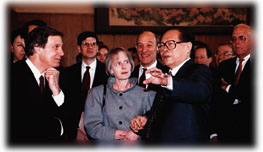![]()
Main Menu · Search · Current Issue · Contact · Archives · Centennial · Letters to the Editor · FAQs
![]()
Main Menu · Search · Current Issue · Contact · Archives · Centennial · Letters to the Editor · FAQs
 President Jiang Zemin meets with President Neil L. Rudenstine and Angelica Zander Rudenstine in Beijing, March 24. Behind them, from left, are William Kirby, Ezra Vogel, and Jack Reardon, executive director of the Harvard Alumni Association. AP PHOTO/LI SHENGNAN President Jiang Zemin meets with President Neil L. Rudenstine and Angelica Zander Rudenstine in Beijing, March 24. Behind them, from left, are William Kirby, Ezra Vogel, and Jack Reardon, executive director of the Harvard Alumni Association. AP PHOTO/LI SHENGNAN |
Harvard launched its new Asia Center, under the direction of Ezra Vogel, Ph.D. '58, Ford professor of the social sciences, in March with a week of academic seminars and speeches. Coexisting with entities such as the Reischauer Institute of Japanese Studies, the Fairbank Center for East Asian Research, and the Korea Institute, the new center is intended to foster research, study, and international exchanges throughout Harvard.
Vogel said the center "will try to extend the scope of Asian research within Harvard from East Asia, where it is very strong, to South and Southeast Asia." The center will also "try to think about Asia as a whole, not just single countries," reflecting the growth of multilateral organizations and common regional political, economic, and social issues. The March events indicated the scope of those issues with symposiums on such diverse topics as Asian medical practice, national and local identity in Southeast Asia, regional history, and what Vogel called the current Asian "economic hiccup."
Speakers at a March 4 forum and dinner celebrating the center's birth gave some sense of the dimensions of that "hiccup." Dr. Shoichiro Toyoda, chairman of Toyota Motor Corporation, addressed the need to effect "structural change" within the economies of the troubled Asian nations, including Japan, while cautioning the international community to approach each country with "constructive advice that respects their diversity of values." He suggested that the Asia Center could help build understanding of those diverse values.
Former vice president Walter F. Mondale, who served as ambassador to Japan from 1993 to 1996, returned from an emergency economic mission to Indonesia in time to deliver his scheduled remarks at the dinner. Citing the role of scholarship in informing public policy, journalism, and the law, he said, "The Asia Center at Harvard could not be more necessary." Mondale focused particularly on the importance of educational exchanges, noting that study abroad means "a lifetime of understanding."
To support its agenda, Vogel said, the center is seeking endowment funds of $15 million through the University Campaign. An additional $10 million will underwrite new professorships in Japanese and Chinese studies, and match existing funds for the Korea Institute. Another $75 million of resources secured in the Campaign will be used in diverse Harvard programs at least partly involving Asia.
Underscoring Harvard's involvement with Asia, at the end of March President Neil L. Rudenstine and his wife, Angelica Zander Rudenstine, set out on the first of two planned trips to that continent. Accompanied by Vogel and William Kirby, Ph.D. '81, the China scholar who chairs the history department, the Rudenstines traveled to Beijing, Hong Kong, and Taipei. Their itinerary, combining academic and alumni affairs, included the first visit to China by a sitting Harvard president.
"Harvard's academic ties with Asia date back more than a century," Rudenstine said before departing, citing the University's research programs and library collections. He also noted the large number of faculty members from Asia, the approximately 1,000 students from the region who are enrolled at Harvard, and the growing community of alumni--now numbering about 8,000--who live there. His trip, he said, underscores Harvard's interest in deepening "understanding of one of the world's most dynamic regions."
On March 23, Rudenstine addressed faculty members and students at Beijing University, which is celebrating its centennial. There, he spoke of "visiting you today not as a representative of another nation or culture, but as a fellow member of the international academic community," interested in learning "within our own countries, but also across national and cultural borders, in a spirit of true exchange." The Asia Center, he said, would promote such exchanges among high-level officials from China, Japan, Korea, and the United States each year. Before departing Beijing, the Harvard group had a private hourlong meeting with Chinese president Jiang Zemin, who had visited Cambridge and delivered a speech in Sanders Theatre last fall (see "Jiang in Cambridge," January-February, page 66). In Hong Kong, Rudenstine, Vogel, and Kirby participated in a panel discussing the effects of the Asian economic crisis.
This trip is Rudenstine's second to the region as Harvard president: he visited Japan and Hong Kong in 1993. A third leg is scheduled for June, when he plans to travel to Tokyo, Seoul, and Shanghai.
Main Menu · Search · Current Issue · Contact · Archives · Centennial · Letters to the Editor · FAQs
![]()